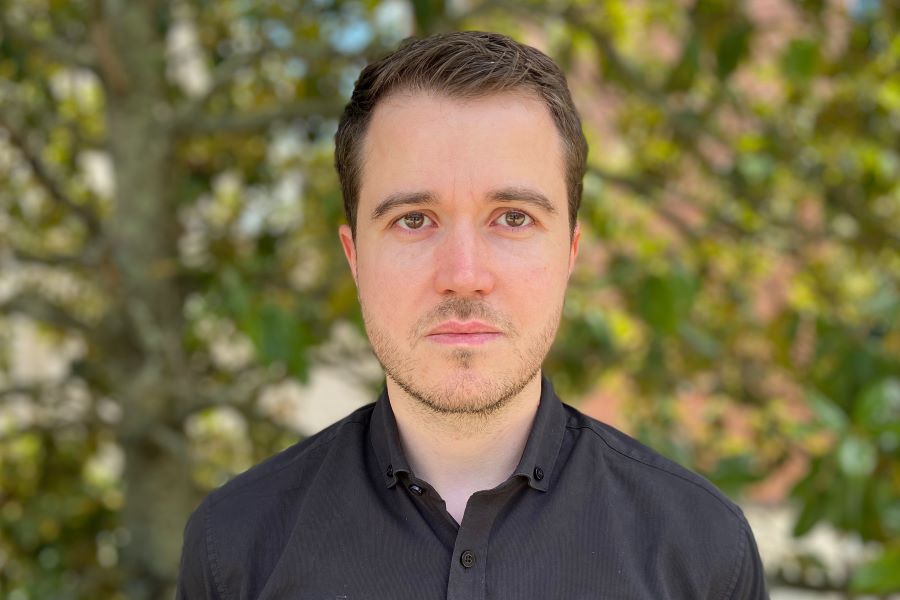FSU physicist awarded NSF CAREER award for theoretical nuclear physics research

A Florida State University physicist has earned one of the most prestigious awards available to early career faculty members for his work in theoretical nuclear physics.
Assistant Professor of Physics Kevin Fossez is a recipient of a 2023 Faculty Early Career Development Award, or CAREER Award, from the National Science Foundation for his work investigating how to better predict properties of new combinations of protons and neutrons at the limits of nuclear stability.
“I am thrilled this award will provide funding for five years to pursue my work within a long-term perspective by building a research group and going deeper into certain problems, like challenging the common understanding of atomic nuclei by producing isotopes with a fleeting existence,” Fossez said. “It is also recognition that my work is valued by the scientific community, which is always appreciated.”
CAREER Awards are NSF’s most prestigious recognition of early career faculty who serve as role models in education and lead research advancement in their departments. Fossez is the 53rd Florida State faculty member to earn a CAREER Award since 2007.
The award provides funding for the researchers’ labs to support students and groundbreaking ideas while granting them an opportunity to work closely with NSF staff on developing their professional endeavors. Activities pursued by CAREER Award recipients build a firm foundation for a lifetime of leadership in integrating their education with their research.
Fossez’s work on exotic nuclei is key to understanding the ways in which subatomic matter organizes itself, which could lead to unexpected applications in the future such as a greater understanding of unique astrophysical objects like supernovae and neutron stars, and more specific theories on the composition and variations in stability of atomic nuclei that make up the matter of the world around us.
“If you use an atomic microscope to look very closely at ordinary matter, like a chair, you will see an astronomical number of small spheres called atoms, each made of a tiny nucleus surrounded by electrons. Inside the nucleus, you will find protons and neutrons, and inside those particles are some strange things,” Fossez said. “The question is: which combinations of protons and neutrons gives you a nucleus that does not break apart? That’s what my work aims to investigate so we can better understand the universe’s total molecular design.”
Fossez, who also teaches nuclear theory, joined FSU’s Department of Physics in 2021. He earned a doctorate from Université de Caen Normandie, in France, in 2014, following which he spent four years working as a research associate at the National Superconducting Cyclotron Laboratory at Michigan State University. Starting in 2019, Fossez served as a Theory Fellow at the Facility for Rare Isotope Beams in Michigan and Argonne National Laboratory in Illinois as part of the facility’s Theory Alliance — a coalition of scientists from universities and national laboratories who seek to foster advancements in theory related to diverse areas of experimental nuclear physics.
Fossez has written 19 peer-reviewed publications. He currently serves as bridge faculty for the Facility for Rare Isotope Beams Theory Alliance, a coalition of scientists from universities and national laboratories who seek to foster advancements in theory related to diverse areas of FRIB science. Bridge faculty are on staff at their home institutions while contributing to the scientific program at FRIB.
“Dr. Fossez was recognized with such an honor because of his unique contributions to the field of nuclear physics that are highly relevant to the many experimental facilities that have been commissioned in the last few years,” said Robert O. Lawton Distinguished Professor Jorge Piekarewicz, an APS fellow widely regarded as a leader in the pursuit of innovative nuclear physics research. “He has developed unique and sophisticated theoretical tools that place him in an excellent position to make significant discoveries in the field of theoretical nuclear physics for years to come.”
To learn more about the NSF CAREER Award Program, visit the National Science Foundation online.
